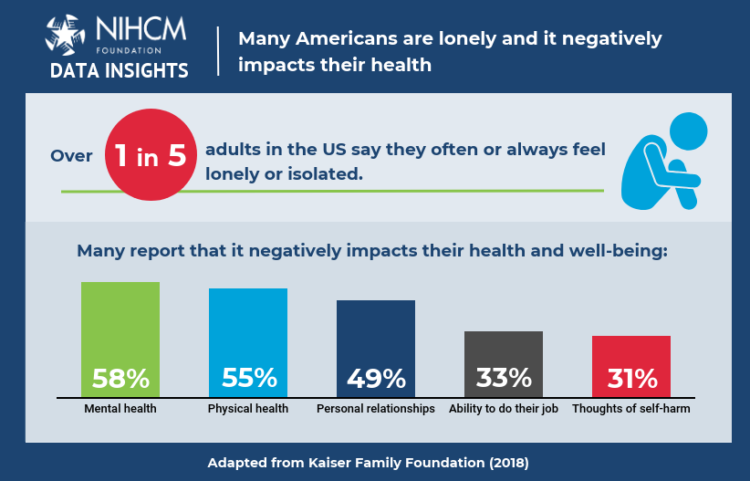NIHCM Newsletter / January 2020
Alleviating Loneliness Through Social Connection

Alleviating Loneliness Through Social Connection
Last month, one woman’s plea to join a family for Christmas drew national attention to the problem of loneliness, which can be particularly acute around the holidays. More than 1 in 5 adults in the U.S. report they are lonely and feel isolated from others, according to a report from the Kaiser Family Foundation. Loneliness is a public health concern because it is linked to lower levels of mental, physical and financial well-being.
All of us can help address this problem in the new year by reaching out to people in our lives who might feel lonely or isolated. Be aware that some people may be socially connected but still feel lonely, perhaps due to a personal struggle, whereas other people who are socially isolated may not perceive themselves as lonely. In reaching out to others, you’ll also improve your own well-being – research shows that social connection plays a big role in happiness.
To better understand the impact of social connection, including the role of social media in helping or hindering connection, the National Institutes of Health is offering funding for research in 2020 and 2021. Additionally, to address concerns about social isolation among aging adults, Florida Blue is partnering with Papa to connect college students to seniors for companionship and assistance.
New Study Finds Opportunities to Improve Suicide Prevention
People who go to the emergency room reporting deliberate self-harm or suicidal ideations are much more likely than their peers to commit suicide in the year after being discharged from the hospital, according to a new study. These findings reveal an opportunity to intervene by screening ER patients for suicide risk and connecting them to the support services they need to prevent suicide.
To make it easier for people to get help, the Federal Communications Commission (FCC) is working to designate 988 as a new nationwide number for a suicide prevention and mental health crisis hotline. The 988 hotline would connect callers to the existing National Suicide Prevention Hotline, which can be reached at 1-800-273-TALK (8255).
Treating Substance Use Disorder in Rural Areas

A new study on substance use disorder treatment for veterans found that use of specific services like medication-assisted treatment - which has proven effective in treating opioid use disorder - was lower in rural areas than urban areas.
The report by the Government Accountability Office (GAO) found that the Department of Veterans Affairs (VA) faces similar challenges to providing health care in rural areas as civilian health care organizations, including lack of transportation for patients and shortages of qualified health care providers.
Like civilian health care systems, the VA is looking to telehealth as a potential approach to expanding access to medication-assisted treatment, though some VA officials told GAO that expanding these services will require a cultural change among providers.
Improving Child Health in Tribal Communities
In collaboration with the American Academy of Pediatrics, the Indian Health Service (IHS) released clinical recommendations to help IHS facilities improve identification, care and outcomes for infants at risk for neonatal opioid withdrawal syndrome (NOWS). Infants exposed to opioids in utero are at risk for NOWS, and its symptoms vary in severity depending on the timing of exposure before delivery, the type of opioid, maternal health and maternal and infant metabolism.
Separately, the Center for Prevention at Blue Cross and Blue Shield of Minnesota awarded funding to two Tribal Nations in Minnesota to address adverse childhood experiences in their communities. This funding is part of a broader effort to advance health equity and community capacity in the state.
Podcast Fights Stigma of Opioid Crisis through Storytelling
Reflecting on the power of storytelling to combat stigma around opioid use disorder, researcher Dr. Glenn Sterner and host Heather Major share how they have been personally impacted by their work for the Someone You Know campaign in the season recap of the Facing the Opioid Crisis Together podcast. Dr. Sterner shares how he was inspired to lift up the stories of people affected by addiction when he met a woman who felt like she couldn't talk to her friends and family about her son's addiction and resulting incarceration. Throughout the season, the podcast by Independence Blue Cross Foundation featured diverse perspectives including people in recovery, medical professionals, local journalists and more.
More Related Articles
See More on: Social Determinants of Health
